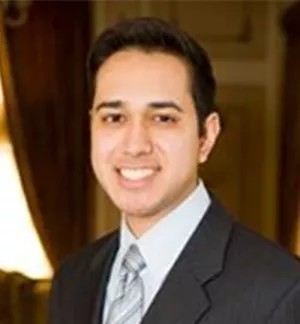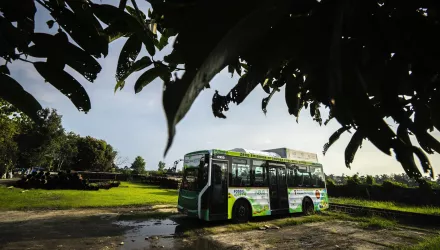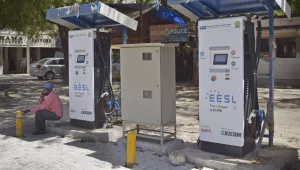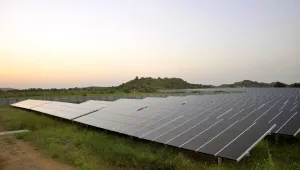Prime Minister Narendra Modi continues to be hugely popular in India, according to a new survey just released by the Pew Research Center. Although more than two years have passed since the Indian leader swept into power in one of the most decisive electoral victories in the country’s history, public confidence in Modi remains high.
Pew’s poll found that more that 81% of Indians held a favorable view of Modi, down slightly from 87% last year. Public approval was not limited to just Modi’s ruling Bharatiya Janata Party (BJP). A majority of respondents from the opposition Congress Party also held a favorable view of the Indian premier.
Notably, Modi’s high approval rating has not diminished the popularity of the Congress Party with 65% of Indians viewing the opposition party and its leaders, Sonia Gandhi and her son Rahul Gandhi, favorably, according to the survey.
Pew conducted interviews of 2,464 randomly selected adults from April 7 to May 24 in 15 states and in New Delhi, India’s capital, who answered a host of questions on a variety of different topics ranging from Modi’s handling of the economy to India’s foreign policy.
The Economy
Modi’s managing of the economy earned him high marks from the Indian public. More than 80% approve of how the Indian leader has managed the economy since taking power in May 2014. Approximately 65% are satisfied with the direction India is heading.
The figures stand in sharp contrast to the polls numbers from 2013 during the Congress Party’s final year governing India. The public’s views on the economy increased 23% from this time while the public satisfaction with the direction of the country increased 36%.
Modi’s high marks in this realm are likely explained by the robust economic growth India has experienced recently. With the economy growing at more than 7.1% by some estimates, India represents the fastest growing large economy in the world, recently surpassing China.
Modi has embarked on an aggressive campaign to implement a series of long overdue reforms aimed at strengthening the economy. These include opening various sectors of the Indian economy to foreign investment, cutting red tape, and introducing a new tax system meant to simplify the byzantine regime currently in place.
Many of his desired reforms, however, have stalled because of governing political realities. The BJP does not control the upper house of India’s Parliament where a proposed bill by Modi focusing on land acquisition has stalled, for example.
Observers are also quick to point out many of the new policies that the Indian leader has put in place do not go far enough, leading many to cast him as an incrementalist rather than a wholesale reformer.
Despite this, the survey reveals that Indians are happy with his progress in this arena so far, particularly when compared to his predecessor.
Domestic Issues
The survey also found that nearly half or more of Indians approve of Mr. Modi’s handling of a range of domestic problems facing the country, including assisting the poor and addressing unemployment (both 62%), handling terrorism (61%) and dealing with corruption (59%).
Though Mr. Modi has garnered criticism from across the Indian political spectrum for inadequately protecting minorities from religious and caste-related violence, the ongoing censure has not damaged his popularity with the Indian public. While more roughly half of those surveyed considered “communal incidents” as a very serious problem plaguing India, they ranked the importance of the issue behind several others such as terrorism, unemployment, and corruption. The results appear to indicate that the issue has less resonance with the general Indian public than the domestic and foreign press would suggest.
Foreign Policy
Modi’s numbers, however, witness a decline when looking at how he’s handled foreign relations with some of the world’s major countries. Although 54% of Indians approve of the way in which their prime minister has managed bilateral ties with the United States, for example, more than 30% expressed no opinion. Public approval of Modi’s stewardship of the U.S.-India relationship is actually down 12 points compared to last year, despite the fact the Indian leader has visited the U.S. more than any other country since taking office.
With respect to China, only 38% of Indians approve of the way Modi has managed relations with Beijing, while 32% disapprove. Support is predictably higher among the Indian premier’s governing BJP Party than the opposition Congress Party.
The numbers become worse when respondents were asked about Pakistan. Only 22% of Indians expressed approval of the way Modi is handling relations with India’s bitter arch rival while 50% expressed disapproval. Pew’s survey revealed that the disapproval was bipartisan. More than 54% of those who identified as BJP supporters and 45 % of those who identified as Congress Party supporters disapproved of the manner in which Modi was managing ties with Pakistan. The figures were unchanged from last.
Modi’s relatively low numbers in the foreign affairs are surprising considering how much the Indian premier has dedicated to forging ties with scores of countries around the world.
Since taking office in May 2014, Modi has made 51 trips to 42 different nations, with four trips to the U.S. alone. His whirlwind diplomacy has created a perception abroad that foreign policy is one of the strongest features of the prime minister’s tenure so far. But the results of Pew’s survey indicate that Indians themselves do not necessarily agree.
The numbers suggest that Indians would like to see their leaders pursue a more aggressive and forceful foreign policy toward Pakistan and China—two countries with whom India has fought several wars in the past.
Overall, Pew’s latest survey is good news for Modi. Support for the Indian Prime Minister and the BJP is drawn from both men and women regardless of age, educational background and income levels and from people in both urban and rural India.
The poll belies claims made by many of India’s elites that the public has grown impatient with Modi and that the Indian leader has failed to live up to the high expectations that surrounded him when he came to office. On the contrary, the prime minister’s honeymoon with the public is far from over.
Desai, Ronak. “Two Years Later, Modi Remains Hugely Popular In India.” Forbes, September 23, 2016





